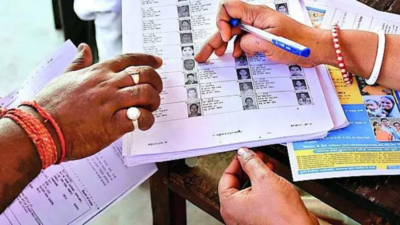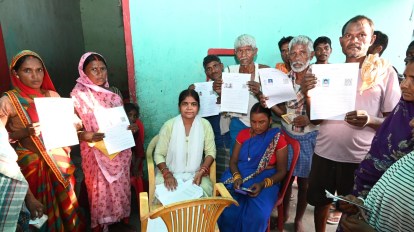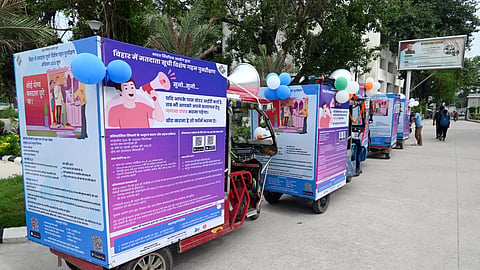As Bihar heads into a crucial election year, the Election Commission of India (ECI) has launched a sweeping Special Intensive Revision (SIR) of the state’s electoral rolls—its first such exercise in over two decades. The move, which has triggered heated political debate, legal scrutiny, and widespread confusion among voters, is being closely watched not only in Bihar but across the country. Here’s an in-depth look at why the ECI is revising the electoral rolls in Bihar now, what the process involves, and why it has become such a contentious issue.
The Special Intensive Revision (SIR) of electoral rolls in Bihar has triggered widespread mobilization across the state’s towns and villages. Booth Level Officers (BLOs) are visiting homes, sometimes multiple times, to ensure every eligible voter is accounted for and every form is correctly filled. For many residents, this is their first direct interaction with the electoral machinery, and while some appreciate the effort to make the process thorough, others are bewildered by the paperwork and the demand for unfamiliar documents. The need to provide proof of citizenship and age has led to long queues at local government offices, with people scrambling to obtain birth certificates, caste certificates, or family registers—documents many never needed before for voting.
This process has exposed the digital divide in Bihar. While urban voters with internet access can download forms and upload documents online, rural and less literate populations are heavily dependent on BLOs and local officials for guidance. In areas with poor connectivity, the process is slow, and the risk of errors or missed entries is higher. Civil society groups have stepped in to assist, setting up help desks and conducting awareness campaigns, but the sheer scale of the revision means many are still left confused or anxious about their status on the rolls.
Political parties have seized on the revision as a rallying point, with opposition leaders accusing the ruling government of using the process to manipulate the voter base. Allegations of bias, selective inclusion, and the targeting of specific communities have become common, fueling tension and suspicion. Ruling party leaders, meanwhile, defend the revision as a necessary step to ensure clean and credible elections, arguing that only genuine citizens should have the right to vote. The debate has spilled into the media and public forums, making the revision a central issue in Bihar’s political discourse.
The legal battle over the SIR has added another layer of complexity. Petitions filed in the Supreme Court and Patna High Court argue that the exclusion of commonly used IDs like Aadhaar and voter cards is arbitrary and unfair, especially when these documents have been accepted in the past. The courts have so far refused to halt the process, but their ongoing scrutiny has forced the Election Commission to periodically review and clarify its guidelines. The possibility of further legal intervention looms, keeping both officials and voters on edge.
For many families, the revision has become a bureaucratic ordeal. Elderly voters, women, and daily wage laborers often find it difficult to gather the required documents or take time off work to visit government offices. Stories abound of voters being told their names are missing or that they need to re-register despite having voted in previous elections. Such experiences have led to frustration and, in some cases, a sense of disenfranchisement, particularly among marginalized communities who already feel excluded from mainstream political processes.

Why Is the ECI Revising Electoral Rolls in Bihar Now?
The ECI’s decision to undertake a Special Intensive Revision of Bihar’s electoral rolls is driven by several factors, both administrative and demographic. The state has not seen such a comprehensive revision since 2003, and in the intervening years, its voter base has surged from 49 million to nearly 79 million. This dramatic increase, coupled with rapid urbanization, high rates of migration, underreporting of deaths, and concerns about the inclusion of ineligible or even illegal foreign voters, has prompted the ECI to act.
The Commission’s stated goal is to ensure that the electoral rolls are “error-free, accurate, and up to date”—a prerequisite for free and fair elections. The ECI has emphasized that the integrity of the electoral roll is fundamental to the democratic process, and that every eligible citizen must be able to vote, while ineligible names—such as those of deceased, shifted, or absentee voters—must be removed. In its notification, the ECI cited its constitutional and legal mandate under Article 324 and Section 21 of the Representation of the People Act, 1950, to prepare and revise electoral rolls, and set July 1, 2025, as the qualifying date for eligibility.
What Makes This Revision ‘Special’ and ‘Intensive’?
Unlike routine annual updates, the current revision is a “de novo” or afresh preparation of the electoral rolls through door-to-door verification. Booth Level Officers (BLOs) are tasked with visiting every household, distributing pre-filled enumeration forms, and collecting supporting documents from all voters—including those already registered. The idea is to leave no room for error: every eligible voter is to be included, and every ineligible entry weeded out.
A key feature of this revision is the requirement that even existing voters (if enrolled after 2003) must provide documentary proof of age and citizenship. This is a departure from previous practices and has created significant confusion and concern, especially among rural, migrant, and less literate populations who may not have ready access to the required documents.

The Administrative Rationale: Addressing Demographic Shifts and Errors
Bihar’s population has seen significant demographic changes over the last two decades. Large-scale migration, both within and outside the state, has led to outdated voter records. Many voters have shifted residences, while deaths have often gone unreported, resulting in the continued presence of deceased individuals on the rolls. The ECI also cites the risk of duplication—where the same person’s name appears in multiple constituencies—as a major concern.
Additionally, the inclusion of names of foreign illegal immigrants has been flagged as a potential threat to the integrity of the electoral process. The SIR is intended to address these issues head-on, ensuring that only Indian citizens above the age of 18 as of July 1, 2025, are included in the rolls, in strict accordance with Article 326 of the Constitution and Section 16 of the Representation of the People Act.
The Political and Legal Storm: Allegations, Fears, and Supreme Court Scrutiny
The timing and scope of the revision have triggered a political storm in Bihar. Opposition parties and civil society groups allege that the process, coming just months before the state’s Assembly elections, could disenfranchise millions—particularly the poor, migrants, and rural voters. The requirement to re-submit documentation, coupled with the exclusion of widely used IDs like Aadhaar and voter ID cards from the list of accepted documents, has fueled suspicion that the exercise could be a “backdoor disenfranchisement drive.”
Legal challenges have reached the Supreme Court, which declined to stay the revision but urged the ECI to consider accepting Aadhaar, voter ID, and ration cards for verification. The Court has scheduled a detailed hearing for later this month and has asked the ECI to address concerns about the process’s fairness, transparency, and potential impact on vulnerable populations.
The Document Dilemma: Why Are Common IDs Excluded?
One of the most controversial aspects of the revision is the ECI’s initial exclusion of Aadhaar, voter ID cards, and ration cards as acceptable proof of eligibility. While Aadhaar is mandatory for new voter registrations under Form 6 of the Registration of Electors Rules, 1960, the ECI argues that it is not proof of citizenship—citing the Supreme Court’s own observations. Instead, the ECI has accepted caste certificates, family registers, and land allotment certificates, among others, which many argue are less accessible to the average voter.
This decision has created confusion and frustration on the ground, with many voters unsure about what documents they need and why previously accepted IDs are now being rejected. The ECI has said it is reviewing its list in light of the Supreme Court’s observations, but as of now, the document dilemma remains unresolved.

The Process: How Is the Revision Being Carried Out?
The ECI has deployed Booth Level Officers across Bihar to conduct house-to-house surveys. These officers distribute pre-filled enumeration forms to existing electors and collect them with supporting documents. Voters can also download and submit the forms online, but digital literacy and internet access remain challenges in many parts of Bihar.
The process is designed to be transparent, with documents uploaded to the ECI’s secure portal, accessible only to authorized officials. Political parties have been encouraged to participate actively in the process, and the ECI has promised to adhere strictly to constitutional provisions regarding voter eligibility and disqualification.
The Stakes: What’s at Risk for Bihar—and India?
The outcome of this revision will have far-reaching consequences. For Bihar, it could determine the credibility of the upcoming Assembly elections and the legitimacy of the next government. For India, it is a test case for similar revisions planned in other states, including West Bengal, Tamil Nadu, and Kerala. If successful, the SIR could set a new standard for electoral integrity nationwide; if mishandled, it could fuel distrust in the electoral process and disenfranchise millions.
At the heart of the controversy is a fundamental question: How can India balance the need for clean, accurate voter rolls with the imperative to protect every citizen’s right to vote? As Bihar’s revision unfolds under the watchful eyes of the Supreme Court, political parties, and civil society, the answer will shape not just the state’s future, but the future of Indian democracy itself.
Follow: Bihar Government
Also Read: Sensex and Nifty Plunge: 10 Key Factors Behind the Market’s Alarming Downturn

